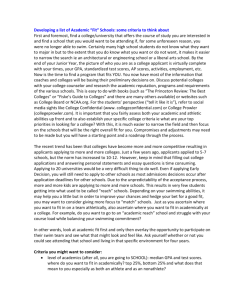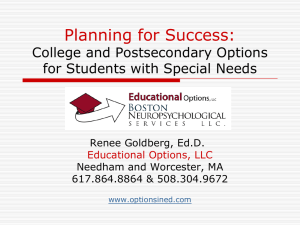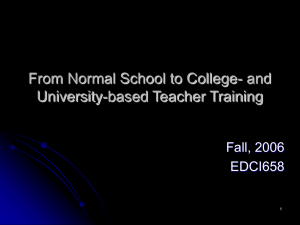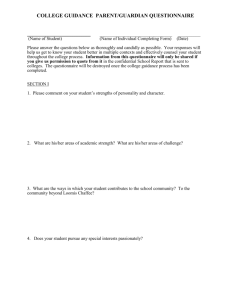RP Group | January 2013 Being the last day of January, Happy New
advertisement
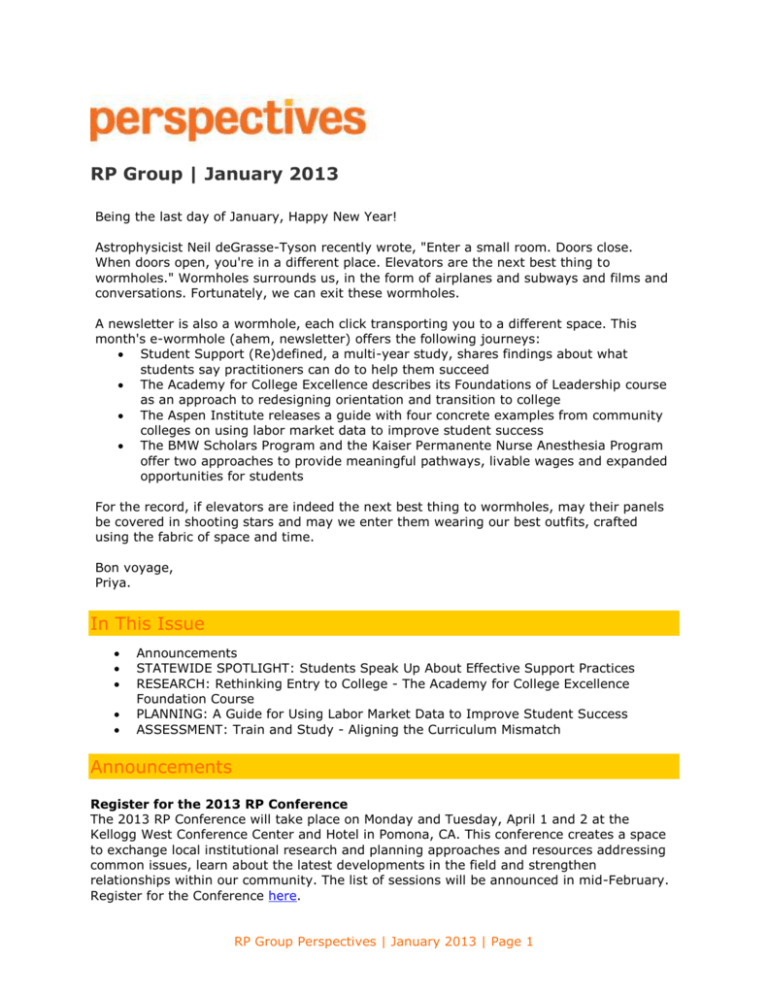
RP Group | January 2013 Being the last day of January, Happy New Year! Astrophysicist Neil deGrasse-Tyson recently wrote, "Enter a small room. Doors close. When doors open, you're in a different place. Elevators are the next best thing to wormholes." Wormholes surrounds us, in the form of airplanes and subways and films and conversations. Fortunately, we can exit these wormholes. A newsletter is also a wormhole, each click transporting you to a different space. This month's e-wormhole (ahem, newsletter) offers the following journeys: Student Support (Re)defined, a multi-year study, shares findings about what students say practitioners can do to help them succeed The Academy for College Excellence describes its Foundations of Leadership course as an approach to redesigning orientation and transition to college The Aspen Institute releases a guide with four concrete examples from community colleges on using labor market data to improve student success The BMW Scholars Program and the Kaiser Permanente Nurse Anesthesia Program offer two approaches to provide meaningful pathways, livable wages and expanded opportunities for students For the record, if elevators are indeed the next best thing to wormholes, may their panels be covered in shooting stars and may we enter them wearing our best outfits, crafted using the fabric of space and time. Bon voyage, Priya. In This Issue Announcements STATEWIDE SPOTLIGHT: Students Speak Up About Effective Support Practices RESEARCH: Rethinking Entry to College - The Academy for College Excellence Foundation Course PLANNING: A Guide for Using Labor Market Data to Improve Student Success ASSESSMENT: Train and Study - Aligning the Curriculum Mismatch Announcements Register for the 2013 RP Conference The 2013 RP Conference will take place on Monday and Tuesday, April 1 and 2 at the Kellogg West Conference Center and Hotel in Pomona, CA. This conference creates a space to exchange local institutional research and planning approaches and resources addressing common issues, learn about the latest developments in the field and strengthen relationships within our community. The list of sessions will be announced in mid-February. Register for the Conference here. RP Group Perspectives | January 2013 | Page 1 Discounted rate for new book on basic skills in California community colleges Basic Skills Instruction in Community Colleges: Inside and Outside of Classrooms reflects the findings of a three-year research project conducted by the University of California at Berkeley and the RP Group. Based on 169 classroom observations and 325 interviews at 20 California community colleges, this newly published book offers insights on issues such as reforming pedagogy, strengthening student services, creating structural coherence, and building leadership at all levels. More details here. Use discount code ERJ60. Statewide Spotlight: Rethinking Entry to College - The Academy for College Excellence Foundation Course Author: Kelley Karandjeff, The RP Group How can we best help students to reach their educational goals? The RP Group asked nearly 900 students from 13 California community colleges what they think supports their educational success, paying special attention to the factors African Americans and Latinos cite as important to their achievement. Student perspectives form the basis of Student Support (Re)defined--a multiyear study (2011-2014) funded by The Kresge Foundation designed to understand how community colleges can feasibly deliver support, both inside and outside the classroom, to improve the success of all learners. We are now releasing two resources-primarily geared toward college practitioners-that summarize findings from the study's first year (2011-2012). Using Student Voices to Redefine Student Support: What Community College Students Say Institutions, Instructors and Others Can Do to Help Them Succeed This report provides a detailed discussion of students' perspectives on how "six success factors"--directed, focused, nurtured, engaged, connected and valued--contribute to their achievement. The report incorporates discussion questions to stimulate dialog about these findings and provides several suggestions for action offered by students in the study that can be used by different constituent groups to support their success. What Students Say They Need to Succeed: Key Themes from a Study of Student Support This brief presents five key themes that (1) synthesize what students say about the six success factors and (2) share specific strategies that students suggest may improve their achievement. This document also includes discussion questions for practitioners to facilitate reflection and planning. In spring 2013, the RP Group will additionally release an action guide designed to help colleges use these findings for institutional planning purposes. Other next steps for Student Support (Re)defined include (1) working with practitioners from the study's participating colleges to explore using Year 1 findings to advance their students' success and (2) collecting concrete examples of institutional strategies designed to help students experience the six success factors at scale. For more information, please visit the project webpage or contact project director Dr. Darla Cooper (dcooper@rpgroup.org). RP Group Perspectives | January 2013 | Page 2 Resources: Student Support (Re)defined website Report: Using Student Voices to Redefine Student Support: What Community College Students Say Institutions, Instructors and Others Can Do to Help Them Succeed Brief: What Students Say They Need to Succeed: Key Themes from a Study of Student Support Research: Rethinking Entry to College - The Academy for College Excellence Foundation Course Authors: Rose Asera and Diego Navarro, Cabrillo College Despite increasing attention to the affective aspects of learning and policy calls to make activities such as orientation and student support courses mandatory, orientation is rarely designed for a student to begin constructing his/her identity as a college student. Typically, an orientation includes an overview of campus resources, perhaps enacted as a scavenger hunt. Orientation may be optional or, as often, overlooked by students. In Back to School: Why Everyone Deserves a Second Chance at Education, Mike Rose describes the need for a broader, more inclusive way to think about orientation and student support, "...the focus tends to be on techniques-how to schedule your day, how to highlight your textbook-while what I'm after here is something more of an orientation to learning, a way of being in school." Students begin college with hope and optimism. But research finds that by the third week they tend to be disillusioned and discouraged. What would make it possible to draw on students' initial enthusiasm yet ground their hope in experiences that effectively prepare them for college? Click here to read an article on the Academy for College Excellence (ACE) Foundations of Leadership Course (Foundation Course), one example of a redesigned orientation and transition to college. It is an intensive, immersive experience during the first two weeks of the semester or beginning part of a summer bridge. The content focuses on 21st century professional skills of collaboration and communication, which are taught experientially. Affective classroom experiences are the foundation for students to grow into academic competence and maturity. Along with individual growth, the Foundation Course fosters a strongly bonded community--a virtual dormitory--that provides ongoing support as students proceed in college. Resources: Rethinking Entry to College, a paper describing the ACE Foundation Course and research on its effectiveness ACE Webinar on the Rethinking Orientation to Community College, Friday, February 1 from 11am to 12:30pm At the Achieving the Dream Conference there will be two ACE events: Diego Navarro's Spotlight presentation on Wednesday, February 6th from 3:15-5:15 titled 'Intrinsic Engagement and Student Support', and A discussion with three ACE partner colleges about their implementation of the ACE RP Group Perspectives | January 2013 | Page 3 orientation in a Workshop on Thursday, February 7th from 9:30-10:45 titled 'A Curriculum Based Intrinsic Model of Student Engagement: Examples from the Field' Videos of a two-part webinar series on the affective precursors to academic performance Planning: A Guide for Using Labor Market Data to Improve Student Success Author: Joshua Wyner, The Aspen Institute Increasingly, higher education institutions are thinking about how to use labor market data to ensure stronger outcomes for every graduate. Because they deliver many credentials tied to specific jobs, community colleges have a particular interest in doing so. It should come as no surprise, then, that some of the best examples of labor market data use in higher education can be found in community colleges. Nor should we be surprised to see community colleges--including those in California and New York--clamoring for their states to provide them greater access employment and earnings information about their graduates. Over the past year, we, at The Aspen Institute, have learned a lot about how college graduates' employment and earnings outcomes relate to the degrees they earn and the colleges they attend. Federal "gainful employment" reports, new data out of Tennessee and Virginia on the earning power of recent graduates in those states, and studies from Georgetown University all point to the same conclusion: what students choose to study matters, as does the college they select to deliver that education. And many initiatives over the past decade, including the Aspen Prize for Community College Excellence, have shown wide institutional variation in graduation rates -- even among similar colleges with similar student bodies. Aspen Institute's College Excellence Program has released a guide designed to advance the use of labor market data among community colleges. "A Guide for Using Labor Market Data to Improve Student Success" offers concrete examples of how five community colleges have used labor market data to assess educational programs, better align them with employment opportunities, and inform students. In addition, the guide describes six specific data sources that colleges can access today to understand relevant labor market demands as well as the employment/earning outcomes of their graduates. In the months and years ahead, ever increasing amounts of employment and earnings data will add to what we know about the value of a college education. Our hope is that this guide will help colleges understand this data, not just to answer inquiries from the press or legislators, but to assess and improve the quality of education they are providing students. Some argue that current labor market data are imperfect, and they are right. Many recent analyses, for example, fail to fully reflect the long-term value of liberal arts degrees. Our expectation is that this information will get better over time. But even today's employment and earnings information tells colleges something important about the quality of the education they provide -- namely, how well it is setting students up for success after they graduate. Surely, that is something every college cares about and will inspire even greater use of labor market information to improve student success in the years to come. RP Group Perspectives | January 2013 | Page 4 Resource: A Guide for Using Labor Market Data to Improve Student Success Assessment: Train and Study - Aligning the Curriculum Mismatch Author: Robert Pacheco, MiraCosta College New connections based on old ideas are emerging between colleges and industry to address a common complaint: what the students are learning does not connect with what employers tell us they need. These new initiatives are designed to provide more meaningful pathways, livable wages and expanded opportunities for students. Here are two examples from manufacturing and health care. In South Carolina, BMW (Bavarian Motor Works) has had difficulty filling technical jobs in fields such as robotics and advanced electronics. A solution? The BMW Scholars Program. This program is an apprentice-like model run through three community colleges providing an opportunity for students to train part-time while they study. Borrowing from emerging European training models (especially from Germany), the BMW program provides about 25 hours-a-week of work at the nearby plant while students hit the books in courses related to the work. Certainly, a match made in the 'new industrial corridor in the South.' BMW provides a supply of qualified training professionals as faculty and state-of-the-art facilities in which students can learn. Community colleges offer the awards and verify the integrity of the degree or certificate. In California, Kaiser Permanente has established a Nurse Anesthesia Program in cooperation with California State University, Fullerton. The combined academic and clinical program results in a Master of Science degree in Nursing with a concentration in Nurse Anesthesia, awarded by Cal State Fullerton, with tuition kept reasonable as a result of Kaiser's foundation arm of the organization. Like BMW, Kaiser offers highly skilled professionals as instructors, teaching students in the very latest health learning environments. Furthermore, Kaiser Permanente is now partnering with Pasadena City College to offer an anesthesia technician program recognized by the American Society of Anesthesia Technologists and Technicians. These more targeted, industry-driven programs are becoming the new face of curriculum development in the career and technical fields. Direct instruction to meet direct industry needs. Nimbleness in design and openness to new educational curriculum models will likely separate the wheat from the chaff in this ever-accelerating information economy. The Research and Planning Group for California Community Colleges | www.rpgroup.org RP Group Perspectives | January 2013 | Page 5



